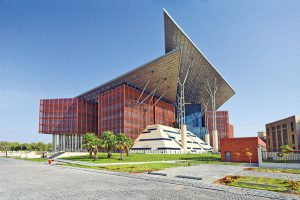ABU DHABI / WAM
The Abu Dhabi Judicial Department (ADJD) organised a webinar on the “Mechanisms to combat money laundering and terrorism financing and the Obligations of Legal Professionals, Officers of the Court and Others Towards these Crimes in the Light of UAE Legislation and Judiciary, and International Experiences”, as part of the efforts to strengthen anti-money laundering endeavours in line with the UAE’s drive to reduce the
financial crimes.
The webinar aims to support the fight against money laundering crimes so as to maintain the UAE’s positive and prestigious reputation worldwide, to consolidate its leading position in the field of financial and commercial control and to reduce abusive or suspicious practices in various business activities.
In his opening address to the forum, Counsellor Mansour Al Marzouqi, Chief Justice of the Abu Dhabi Criminal Court, highlighted the importance of reinforcing the anti-money laundering mechanisms to support the fight made in this regard, in line with the directives of HH Sheikh Mansour bin Zayed Al Nahyan, Deputy Prime Minister and Minister of Presidential Affairs, and Chairman of the Judicial Department of Abu Dhabi, to establish a judicial system that enhances the protection of both society and the economy against the effects of crime.
For his part, Mohammad Alhassani, Chief Prosecutor at the Major Financial Matters Prosecution, and Head of the International Cooperation Section at the Technical Office of the Attorney General of the Emirate of Abu Dhabi, discussed the challenges and solutions in the fight against money laundering and the local and global obligations, addressing the nature of money laundering crimes, their elements and historical roots, underscoring the competencies of the Abu Dhabi Money Laundering and Tax Evasion Crimes Court, the process behind the implementation of international judicial cooperation requests in criminal cases and the challenges encountered in this context, the mutual evaluation of the crimes of money laundering and the financing of terrorism, and the role of the business sector in addressing them.
Alhassani further stressed the importance of international cooperation in risk identification, policy development and coordination, the prosecution of money laundering, terrorist financing and arms proliferation crimes, the application of preventive measures in the financial sector and other specified sectors, granting the necessary powers and responsibilities to the competent authorities in terms of investigation, law enforcement and control, improving transparency, availability of information on beneficial ownership among legal persons (companies), legal arrangements, and facilitating international cooperation.
For his part, Dr. Ridha Khemakhem, Judge at the Abu Dhabi Court of Appeal, reviewed the UAE’s efforts in combating money laundering and the legislative and institutional mechanisms the country has adopted in this regard, as well as the most important international agreements and treaties signed by the UAE. He also pointed to the sustained efforts to develop the judicial system in the Emirate of Abu Dhabi to deal with these crimes and to prosecute the perpetrators and bring them to justice by taking several measures in cooperation with the relevant authorities through a developed legislative and judicial system.
 The Gulf Time Newspaper One of the finest business newspapers in the UAE brought to you by our professional writers and editors.
The Gulf Time Newspaper One of the finest business newspapers in the UAE brought to you by our professional writers and editors.
